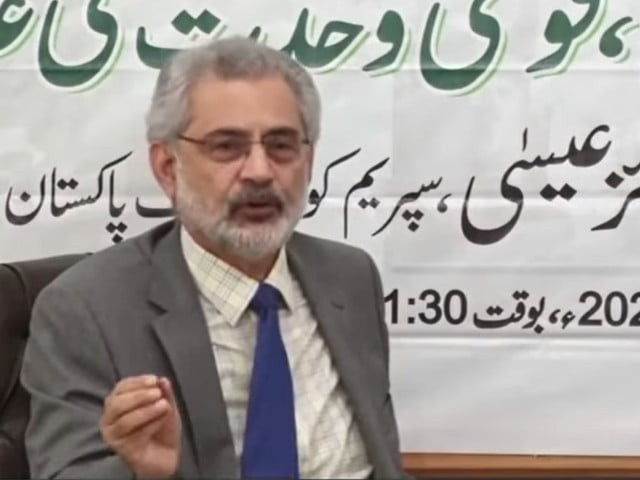Suo motu domain of SC, not just CJ’s: Justice Isa
Senior puisne judge says the power used for both good and bad reasons

Justice Qazi Faez Isa, the senior puisne judge of the Supreme Court, said on Wednesday that the Constitution empowered the apex court as a whole to take notice of cases under its original jurisdiction under Article 184(3) ie suo motu, and not just the top judge.
Speaking at an event commemorating the golden jubilee of the Constitution of Pakistan, Justice Isa stressed that the book of Constitution “is not to serve the interests of a select few people – politicians, parliament or the judiciary – but the people”.
“The meaning of the Supreme Court in Article 184(3) is that all judges and the chief justice unanimously [invoke original jurisdiction]”, he said. “My opinion is not important, the opinion will be that of the Constitution,” he added.
“I could be wrong but in Article 184(3) the word suo motu does not even exist,” he said, explaining that it only included matters of “public interest” and the provision of fundamental rights.
“The way I understand, this space was left for the oppressed, for the brickkiln workers, for bonded labourers, for women denied education and children forced into labour” because ordinary legal provisions could not tend to their plight,” he continued.
Article 184(3) sets out the apex court’s original jurisdiction, and empowers it to take notice of matters involving the question of “public importance” with reference to the “enforcement of any of the fundamental rights” of the people.
“Sometimes this provision has been used for very good purposes but sometimes for really bad ones,” the senior puisne judge said, stressing that the suo motu notices should be dealt with “great care” because there was no constitutional space for appeal against it.
During the event, Justice Isa — who is slated to become the next chief justice of Pakistan in September — was asked about the difference in opinion regarding the top judge’s suo motu powers.
Justice Isa acknowledged that some of his colleagues believed that “only the chief justice had the power” to take suo motu notices, adding however, that “the Constitution does not state this”. He called for setting aside “egos” in deciding such matters.
A dark history
He also reflected on the ‘Fall of Dhaka’ as a dark chapter in the history of Pakistan, saying that the spilt between Pakistan and Bangladesh in 1971was not “sudden”. Its seeds, he added, were sown by Justice Munir in the 1950s.
He also spoke of the inclusion of Article 58(2)(b) during the dictatorial regime of Gen Ziaul Haq, which allowed the president to dissolve the assembly and dismiss an elected government. He termed the provision “another seed of hatred”.
“The same article [58(2)(b)] was later used twice by the next president Ghulam Ishaq Khan, once against Benazir Bhutto’s government and the next time against Nawaz Sharif’s,” Justice Isa said.
“It also brings some shame to me that the Supreme Court kept on supporting these steps. It was challenged that the resolution is wrong but they [the SC’ said ‘Let’s move on’,” Justice Isa continued.
He also included Gen Parvez Musharraf in his criticism mentioning not only his “Proclamation of Emergency” but also his introduction of Article 270AAA to the Constitution.
Nonetheless, the senior judge stressed that in his opinion, the purpose of the Constitution was to serve the interests of the people. He hoped that the critical juncture would allow Pakistan to break free from the mistakes of the past.



















COMMENTS
Comments are moderated and generally will be posted if they are on-topic and not abusive.
For more information, please see our Comments FAQ